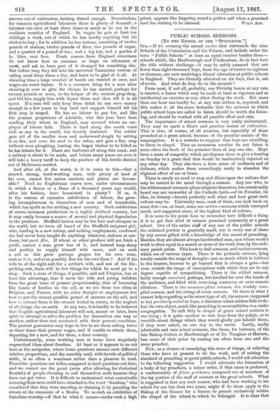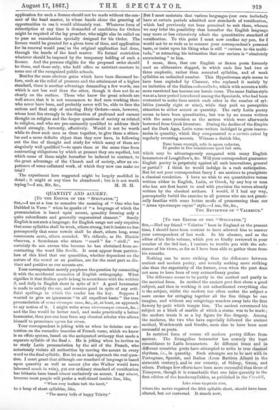PUBLIC SCHOOL SERMONS.
[To THE EDITOR OF THE " SPECTA.TOR.'l
SIR,-If we overstep the sacred cordon that surrounds the nine Schools of the Commission and the Primer, and include under the term "Public Schools" at least an equal number besides those— schools which, like Marlborough and C heltenham, do in fact bear the title without challenge—it may be safely assumed that not fewer than eight thousand boys, from the age of twelve to eighteen or nineteen, are now receiving a liberal education at public schools in England. They are liberally educated on six days, that is, out of seven. And what do they do on the seventh ?
From most, if not all, probably, one Divinity lesson at any rate is exacted, a lesson which may be made at least as vigorous and as intellectual an exercise as any other during the week. But more than one hour can hardly be, at any rate seldom is, required, and this makes it all the more desirable that the sermons to which public school boys are called to listen should be worth the listen- ing, and should be worked with all possible effort and care.
The importance of school sermons is very easily understated. They may be made a direct and genuine means of cultivation. This is true, of course, of all sermons, but especially of those preached at a great school, because of the peculiar nature of the congregation. It is a mistake to suppose that boys are unwilling to listen in chapel. That an enormous number do not listen is more often the fault of the preacher than of any one else. Boys have a sense of congruity which predisposes them to give a hearing on Sunday to a great deal that would be instinctively rejected on any other day. They also have a keen sense of unfitness and of dullness, which makes them" exceedingly ready to abandon the slightest effort of ear or brain.
There is surely no need to stop and dilate upon the culture that may be carried to the mind through a sermon. Any one who, in the wilderness of common-place religious discourses, has occasionally heard one not unworthy of the Catholic faith—of its Founder, its idea, its history—knows perfectly well what and how great such culture may be. University men, most of them, can look back on some few—on, at least, some one or two—sermons which conveyed much, and suggested more, of the highest kind of culture.
It is more to the point here to remember how difficult a thing it is to get that kind of sermon preached constantly at a great school. Out of the entire staff of any one of the public schools the ordained portion is generally small, nor is every one of these by any means gifted with a knowledge of the secret of preaching. Besides, they are almost always hardworked men, men whose week's work is often equal to a month or more of the work done by the ordi- nary parish priest. This leads to dull sermons, and useless sermons, which are of various types. There is the pedantic sermon, lying totally outside the range of thought—not so much which is habitual to the hearers, because to go beyond that is always a gain—but even outside the range of conceptions with which they are in any degree capable of sympathizing. There is the stilted sermon, fairly enough conceived, perhaps, but levelled far over the heads of the audience, and filled with over-long sentences or over-remote allusions. There is the common-place sermon, the crudely com- piled sermon, and the string-of-texts sermon. Or there is what I cannot help regarding as the worst type of all, the sermon (supposed to be) peculiarly suited to boys, a discourse which seldom fails to de- feat its own object, much like preaching in monosyllables to a rustic congregation. To talk fitly in chapel of grave school matters is one thing ; it is quite another to rate boys from the pulpit, or to twaddle about things which they would gladly put behind them, if they were asked,, on one day in the seven. Lastly, really admirable and rare school sermons, like those, for instance, of the late Bishop Cotton at Marlborough or of Dr. Vaughan at Harrow, lose some of their point by coming too often from one and the same preacher.
Now, as a chance of remedying this state of things, of relieving those who have at present to do the work, and of raising the standard of preaching at great public schools, I would ask attention to the following suggestion. I would advocate the formation of a body of lay preachers, a minor order, if that name is preferred, a confraternity of freres pricheurs, composed out of members of the lay portion of the staff of masters at the great schools. What is suggested is that any such master, who had been working in his school for not less than two years, might if he chose apply to the Bishop of the diocese for a licence to preach exclusively within the chapel of the school to which he belonged. It is clear that application for such a licence should not be made without the con- sent of the head master, in whose hands alone the granting of opportunities to use it would ultimately rest. Whatever form of subscription at any time is demanded of candidates for Orders might be required of the lay preacher, who might also be called on to pass an examination specially designed for his Order. The licence would be granted for a given term of time, and application for its renewal would pass: as the original application had done, through the hands of the head master. No formal restriction whatever should be imposed by the temporary holding of such a licence. And the persons eligible for the proposed order should be those, and those only, who hold office as assistant-masters in some one of the recognized public schools.
Besides the more obvious gains which have been discussed be- fore, such as the relief of pressure and the attainment of a higher standard, there is another advantage demanding a few words, one which is not less real than the other, though it does not lie so clearly on the surface. Those who know the great schools are well aware that it is not uncommon to find men working there who never have been, and probably never will be, able to face the serious and final step of entering Holy Orders—men, however, whose bent lies strongly in the direction of profound and earnest thought on religion and the deeper questions of society as related to religion, and who are pre-eminently qualified to address their school strongly, fervently, effectively. Would it not be worth while to draw such men as these together, to give them a stimu- lus and a more definite object than they now have, in following out the line of thought and study for which many of them are singularly well qualified ?—to spare them at the same time from contracting obligations by which at present they are repelled, but which some of them might hereafter be induced to contract, to the great advantage of the Church and of society, after an ex- perience of some collateral work, of which they now can make no trial?
The experiment here suggested might be largely modified in detail ; it might at any time be abandoned ; but is it not worth































 Previous page
Previous page